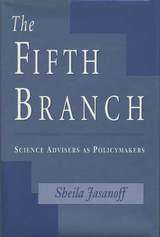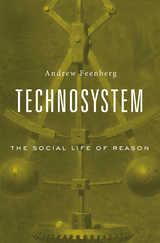

How can decisionmakers charged with protecting the environment and the public’s health and safety steer clear of false and misleading scientific research? Is it possible to give scientists a stronger voice in regulatory processes without yielding too much control over policy, and how can this be harmonized with democratic values? These are just some of the many controversial and timely questions that Sheila Jasanoff asks in this study of the way science advisers shape federal policy.
In their expanding role as advisers, scientists have emerged as a formidable fifth branch of government. But even though the growing dependence of regulatory agencies on scientific and technical information has granted scientists a greater influence on public policy, opinions differ as to how those contributions should be balanced against other policy concerns. More important, who should define what counts as good science when all scientific claims incorporate social factors and are subject to negotiation?
Jasanoff begins by describing some significant failures—such as nitrites, Love Canal, and alar—in administrative and judicial decisionmaking that fed the demand for more peer review of regulatory science. In analyzing the nature of scientific claims and methods used in policy decisions, she draws comparisons with the promises and limitations of peer review in scientific organizations operating outside the regulatory context. The discussion of advisory mechanisms draws on the author’s close scrutiny of two highly visible federal agencies—the Environmental Protection Agency and the Food and Drug Administration. Here we see the experts in action as they deliberate on critical issues such as clean air, pesticide regulation, and the safety of pharmaceuticals and food additives.
Jasanoff deftly merges legal and institutional analysis with social studies of science and presents a strong case for procedural reforms. In so doing, she articulates a social-construction model that is intended to buttress the effectiveness of the fifth branch.

We live in a world of technical systems designed in accordance with technical disciplines and operated by personnel trained in those disciplines. This is a unique form of social organization that largely determines our way of life, but the actions of individuals and social protest still play a role in developing and purposing these rational systems. In Technosystem, Andrew Feenberg builds a theory of both the threats of technocratic modernity and the potential for democratic change.
Feenberg draws on the tradition of radical social criticism represented by Herbert Marcuse and the Frankfurt School, which recognized the social effects of instrumental rationality but did not advance a convincing alternative to the new forms of domination imposed by rational systems. That is where the fine-grained analyses of Science, Technology, and Society (STS) studies can contribute. Feenberg uses these approaches to reconcile the claims of rationality with the agency of a public increasingly mobilized to intervene in technically based decisions. The resulting social theory recognizes emerging forms of resistance, such as protests and hacking, as essential expressions of public life in the “rational society.”
Combining the most salient insights from critical theory with the empirical findings of STS, Technosystem advances the philosophical debate over the nature and practice of reason in modern society.
READERS
Browse our collection.
PUBLISHERS
See BiblioVault's publisher services.
STUDENT SERVICES
Files for college accessibility offices.
UChicago Accessibility Resources
home | accessibility | search | about | contact us
BiblioVault ® 2001 - 2024
The University of Chicago Press









